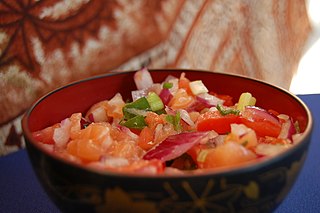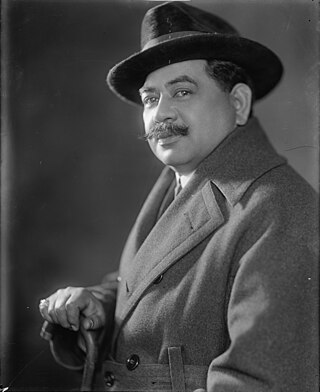Related Research Articles

Hilo is the largest settlement in Hawaii County, Hawaii, United States, which encompasses the Island of Hawaii, and is a census-designated place (CDP). The population was 44,186 according to the 2020 census. It is the fourth-largest settlement in the state of Hawaii, the largest settlement in the state outside of Oahu, and the largest settlement in the state outside of the Greater Honolulu Area.

The University of Hawaiʻi at Hilo is a public university in Hilo, Hawaiʻi. It is one of ten campuses of the University of Hawaiʻi System. It was founded as Hilo Center at Lyman Hall of the Hilo Boys School in 1945 and was a branch campus of the University of Hawaiʻi at Mānoa. In 1970 it was reorganized by an act of the Hawaiʻi State Legislature and became a campus within the newly created University of Hawaiʻi System.

Lomi lomi salmon is a side dish in Hawaiian cuisine containing salted salmon, onions, and tomatoes. Its origin is similar to poisson cru. It also resembles pico de gallo in appearance and to how it is often consumed as an accompaniment to other foods such as poi or kalua pork.

Jonah Kūhiō Kalanianaʻole was a prince of the Kingdom of Hawaiʻi until it was overthrown by a coalition of American and European businessmen in 1893. He later went on to become a representative in the Territory of Hawaii as delegate to the United States Congress, and as such is the only royal-born member of Congress.

Ruth Ke‘elikōlani, or sometimes written as Luka Ke‘elikōlani, also known as Ruth Ke‘elikōlani Keanolani Kanāhoahoa or Ruth Keanolani Kanāhoahoa Ke‘elikōlani, was a member of the House of Kamehameha who served as Governor of the Island of Hawaiʻi and for a period, was the largest and wealthiest landowner in the Hawaiian Islands. Keʻelikōlani's genealogy is controversial. Her mother's identity has never been in question but her grandfather Pauli Kaōleiokū's relationship to Kamehameha I is heavily disputed. While her father has been legally identified as early as 1864, disputes to that lineage continued as late as 1919. As one of the primary heirs to the Kamehameha family, Ruth became landholder of much of what would become the Bernice Pauahi Bishop Estate, funding the Kamehameha Schools.

The Hawaiʻi State Library is a historic building in Honolulu, Hawaii, United States, that serves as the seat of the Hawaiʻi State Public Library System, the only statewide library system and one of the largest in the United States. The Hawaiʻi State Library building is located in downtown Honolulu, adjacent to ʻIolani Palace and the Hawaiʻi State Capitol. Originally funded by Andrew Carnegie, the building was designed by architect Henry D. Whitfield. Groundbreaking took place in 1911 and construction was completed in 1913. In 1978, the building was added to the National Register of Historic Places, as a contributing property within the Hawaii Capital Historic District.

King Kamehameha I Day on June 11 is a public holiday in the U.S. state of Hawaii. It honors Kamehameha the Great, the monarch who first established the unified Kingdom of Hawaiʻi—comprising the Hawaiian Islands of Niʻihau, Kauaʻi, Oʻahu, Molokaʻi, Lānaʻi, Kahoʻolawe, Maui, and Hawaiʻi. In 1883 a statue of King Kamehameha was dedicated in Honolulu by King David Kalākaua. There are duplicates of this statue in Emancipation Hall at the Capitol Visitor Center in Washington, D.C., and in Hilo, island of Hawaiʻi.

Miriam Auhea Kalani Kui Kawakiu o Kekāuluohi Kealiʻiuhiwaihanau o Kalani Makahonua Ahilapalapa Kai Wikapu o Kaleilei a Kalakua also known as Kaʻahumanu III, was Kuhina Nui of the Kingdom of Hawaii, a queen consort of both Kamehameha I and Kamehameha II, and mother of Lunalilo. In ʻŌlelo Hawaiʻi, Kekāuluohi means; "the vigorously growing vine". She adopted her secondary name Auhea, meaning Where, oh where, in memory of the death of Kamehameha I.

Don Francisco de Paula Marín was a Spaniard who became influential in the early Kingdom of Hawaii. Often called Manini, Marini or other variations, he became a confidant of Hawaiian King Kamehameha I. Marín acted as a jack-of-all-trades, sometimes even acting as a physician, probably without any formal education, and is credited with introducing many agricultural products.
Helena Kalokuokamaile Wilcox Salazar-Machado was an aspirant head of the royal family of the Kingdom of Hawaii.
Hawaii is one of the few U.S. states where coffee production is a significant economic industry – coffee is the second largest crop produced there. The 2019–2020 coffee harvest in Hawaii was valued at $102.9 million. As of the 2019-2020 harvest, coffee production in Hawaii accounted for 6,900 acres of land

Benjamin Franklin Pitman was an American businessman who married Hawaiian nobility.

Timothy Henry Hoʻolulu Pitman was an American Union Army soldier of Native Hawaiian descent. Considered one of the "Hawaiʻi Sons of the Civil War", he was among a group of more than one hundred documented Native Hawaiian and Hawaii-born combatants who fought in the American Civil War while the Kingdom of Hawaiʻi was still an independent nation.

"Auntie" Alice Kuʻuleialohapoʻinaʻole Kanakaoluna Nāmakelua (1892–1987) was a Hawaiian composer and performer. Nāmakelua was also a kumu hula dancer and lei-maker. She was an expert performer of the slack-key guitar and a master of the Hawaiian language. Nāmakelua was a mentor of other musicians and wrote around 180 songs of her own. She was inducted into the Hawaiian Music Hall of Fame in 2011.

Emma ʻAʻima Aʻii Nāwahī was a Native Hawaiian political activist, community leader and newspaper publisher. She and her husband Joseph Nāwahī were leaders in the opposition to the overthrow of the Kingdom of Hawaiʻi and they co-founded Ke Aloha Aina, a Hawaiian language newspaper, which served as an important voice in the resistance to the annexation of Hawaiʻi to the United States. After annexation, she helped establish the Democratic Party of Hawaiʻi and became a supporter of the women's suffrage movement.
Edna Isabel Allyn was the first librarian of what is now the Hawaii State Library.

Mary Ann Kinoʻole Kaʻaumokulani Pitman, later Mary Pitman Ailau, was a high chiefess of the Kingdom of Hawaiʻi of part Native Hawaiian and American descent. She was raised and educated in Hilo and Honolulu and served as a maid of honor and lady-in-waiting of Queen Emma, the wife of Kamehameha IV. In 1861, she left for the United States with her family, and she lived for the next twenty years in New England. She visited her distant cousin King Kalākaua during his state visit to the United States in 1875. She returned in 1881 to Hawaiʻi where she married musician John Keakaokalani Ailau, better known as Jack Ailau. In later life, she invested in Hawaiian curio shops selling artifacts of Hawaiiana; many of her collections are preserved in the Bernice Pauahi Bishop Museum.

Helen Wong Smith is an American archivist and librarian. She is the archivist and librarian for University Records at the University of Hawaiʻi at Mānoa. She works in the University Archives and Manuscripts Collection of the Public Services Division. She is formerly an Archivist and Librarian for the State Historic Preservation Division as well as the Executive Director of the Kauaʻi Historical Society. Smith is an active member of the Society of American Archivists, becoming President in 2023, and having served in many leadership roles including on the Council, the Committee on Education, and the Nominating Committee from 2012-2014. Smith was named an SAA Fellow on June 10, 2016.

The Hawaiʻi Library Association (HLA) is a professional organization for Hawaii's librarians and library workers created "to promote library service and librarianship in Hawai'i." It is headquartered in Honolulu, Hawai'i. The Hawai'i Library Association was organized at a meeting of 20 county librarians on January 16–17, 1922. Clara Hemenway, director of the University of Hawaiʻi Library was the first president. The association's first informal meeting was in 1922; Margaret Newman was the first elected president at their first official meeting in 1924. HLA became a chapter of the American Library Association at that same meeting, in March 1924.
Esther Takakura Mookini was an American linguist responsible for several widely used Hawaiian-language dictionaries.
References
- 1 2 "Apr 07, 1955, page 5 - Honolulu Star-Bulletin at Newspapers.com". Newspapers.com. Retrieved 2024-07-27.
- 1 2 3 4 Bernardo, Rosemarie (2011-01-14). "Archivist knew isles by heart". Honolulu Star-Advertiser. Retrieved 2024-07-27.
- 1 2 3 "Agnes Conrad Award". Association of Hawai'i Archivists. 2011-04-30. Retrieved 2024-07-27.
- ↑ Tamashiro, Shari Y. (2017). "The 125th Anniversary of the Hawaiian Historical Society". Hawaiian Journal of History. 51: 1–4. ISSN 2169-7639.
- 1 2 Conrad, Agnes C. (1969). "Hawaiian Registered Vessels". The Hawaiian Journal of History. 3: 31–41.
- ↑ "Hilo: UH Hilo archivist receives Agnes C. Conrad Award | University of Hawaii News". manoa.hawaii.edu. Retrieved 2024-07-27.
- ↑ Conrad, Agnes (1980-08-01). "Sources for Family History in Hawaii". Mormon Pacific Historical Society. 1 (1).
- ↑ Conrad, Agnes C. (1967). "The archives of Hawaii". The Journal of Pacific History. 2 (1): 191–197. doi:10.1080/00223346708572115. ISSN 0022-3344.
- ↑ Tachihata, Chieko; Conrad, Agnes C., eds. (2001). THE WRITTEN RECORD OF HAWAI'I'S WOMEN: An Annotated Guide to Sources of Information in Hawai'i (2 ed.). Honolulu, Hawai'i: Foundation for Hawaii Women's History.